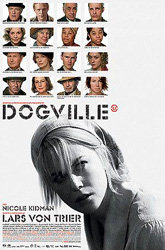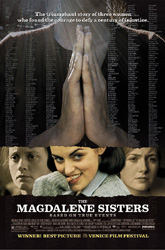 Director: Starring: Release: 26 Mar. 03
|
Dogville BY: DAVID PERRY In Lars von Trierís Dogville, the entire set is like a crime scene, chalk outlines show the various walkways, walls, bridges, and gardens of the little Depression-era Colorado mining town. This isnít a crime scene yet, but just the barebones of civilization and, perhaps, civility. Once Grace (Kidman) enters this fairytale village (the John Hurt narration and nine chapters plus prologue and epilogue that fill the film give it the affect of a Grimm adult fairytale), though, the crime becomes impossible resist, even for a place that prides itself in its neighborliness. Brechtian nearly to a fault, the film keeps to these chalk markings as the characters enter their homes, mimicking opening and closing doors, looking out windows as sound effects finish the illusion of confines within these outlines. Von Trier is making it clear that artifice is key to this drama -- like a Bertolt Brecht variation on Thornton Wilderís Our Town, Dogville is pure allegory, and pure genius. The humans in the film are certainly no better than dogs, their actions seemingly built on primal decisions without any interest in human feelings. All of the nearly two dozen townspeople -- from a kindly old blind man (Gazzara) to a kindly old lady (Bacall) to a kindly young suitor (Bettany) -- are nice at first, but their evolution to misanthropic demons is painful. Von Trier is often accused of this very action, that he, as the director and purveyor of images for the audience, becomes a sadist, trying to destroy both his actors and his viewers. Dogville does share the conditional misanthropy (with hints of misogyny) but without becoming completely unforgivable (as was the case with his utterly misconceived Dogme entry, The Idiots). In fact, even as the film becomes almost farcical in its representation of human cruelty -- ball and chains, ritualistic rape -- the humanity (if one can call it that) of the situation is clear and impenetrable. History is filled with occasions when people became their worst at times of superiority. Dogville is no great stretch of the imagination. The direct inspiration for Dogville is the song ďPirate JennyĒ from Brechtís Threepenny Opera, a tale of a woman wronged by those around her and the comeuppance they receive by her hand. In the song, the destruction is upon a commercially enterprising community and the destructor was the pirates who took that commercialism even further. For Dogville, the catalyst isnít as much commerce as it is power. Grace, who must cede her power to the people of Dogville, is at first defenseless to their wielding of it. She is morally and physically corrupted by their arrogance and cruelty. After all, the reason sheís on the run, to get away from the gangster lifestyle she finds abhorrent, seems utterly acceptable once she sees the reactions of those in this little town. Ultimately, Dogville is clearly indicated to be America. Power for the nation has been an intoxicator, one that has allowed the country to take steps that might seem arrogant and cruel to the rest of the world. Broken down to our foundations by the Depression (like the way the Dogville set is merely a foundation), America has been able to wield its power in ways that cripple disagreeing groups. Von Trier, who openly admits to Communist beliefs and a fraternal feeling with the Soviets, is establishing that 11 September 2001 is begetting a new reactionary drama for the global hegemon. The crime scene is all around the old foundations of the World Trade Center. Terrorism is merely the cyclic
reaction to a domineering America in world affairs, as is von Trierís
evident supposition. All the groups -- the terrorists and the
authoritarians, the gangsters and the townspeople -- are evil. One question
remains: which evil is worse? |
|
| ©2003, David Perry, Cinema-Scene.com, 4 July 2003 | ||


